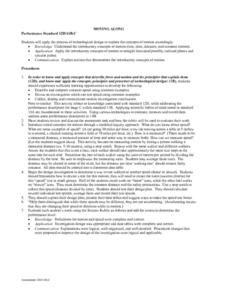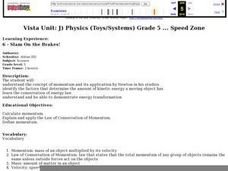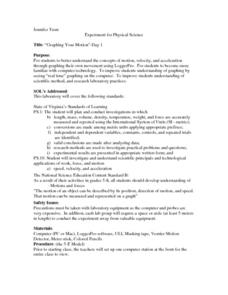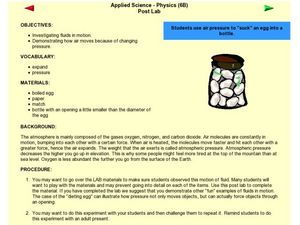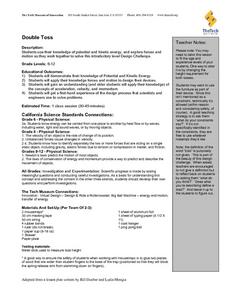Curated OER
Moving Along
Young scholars are introduced to the concept of motion. In groups, they practice calculating the rate, time, and distance of various objects on a variety of surfaces. To end the lesson, they apply the same principles to those objects...
Curated OER
Gravitational Factors
Students identify the forces that affect the weight of an object. In groups, they determine the proper math model which can demonstrate the attraction between two objects based on gravity. They discuss the relationship between the weight...
Curated OER
Action-Reaction! Rocket
Students construct a rocket from a balloon propelled along a guide string. They use this model to learn about Newton's three laws of motion, examining the effect of different forces on the motion of the rocket. They measure the distance...
Curated OER
Sports and Science
Using footballs, basketballs, tennis balls, and more, learners conduct experiments to illustrate Newton's Laws of Motion. The experiments are conducted outside, and require them to throw, kick, and hit a variety of balls. Your...
Physics Classroom
Action-Reaction Lab
Computer-interfaced motion detectors are required to carry out this inquiry. It is a new twist on exploring motion with plunger carts: they are set back-to-back and then propelled away from each other. Their velocities are measured, and...
NTTI
Vectors: Traveling, But in What Direction
High schoolers watch a video of real-world situations regarding speed, direction, velocity, force, etc. and answer questions while viewing. They then practice drawing and using vectors to solve more real-world problems.
Virginia Department of Education
States and Forms of Energy
Energy is just energy, right? Explain various forms of energy to your young scientists by using an interactive experiment that contains common objects to demonstrate complex concepts. Pupils conduct experiments for radiant, thermal,...
American Chemical Society
Does Temperature Affect Dissolving?
When making sweet tea, why do people dissolve the sugar in hot tea instead of cold tea? The class discusses the previous lab and builds upon it. Working in groups, they design an experiment to determine how temperature affects the...
PHET
Science and Engineering Conference
Young scientists present their experimental designs from the previous experiment. The ninth activity in the series outlines what learners should present, what class discussions should happen, and the solution NASA came up with for the...
PHET
Mapping the Field of Multiple Dipole Magnets
So you built a magnetometer, now what? High school scientists use their magnetometer made in a previous lesson to map the union of magnetic fields of dipole magnets. They experiment with different alignments and draw conclusions about...
Curated OER
Slam On the Brakes!
Fifth graders study the concept of momentum and its application by Newton in his studies. They view a demonstration and complete an experiment with toy cars on a racetrack that shows them the properties of momentum and how velocity and...
NASA
Rocket Wind Tunnel
Using a teacher-built wind tunnel constructed from a paper concrete tube form, a fan, and a balance, individuals determine the amount of drag their rocket design will experience in flight. Pupils make modifications to increase the...
Curated OER
Sky Observations Sky & Cloud Windows
Students observe the sky and weather to gather data. They conduct experiments to answer questions about the sky and weather phenomena. They measure, analyze and present data. They create sky windows by gluing sky colored paint chips...
Teach Engineering
Tissue Mechanics
Engage your class by showing them how silly putty and human tissues are alike. Pupils learn more about tissue mechanics by reflecting upon their experiences with silly putty. The lesson covers collagen, elastin, and...
Curated OER
Graphing Your Motion-Day 1
Ninth graders explore the concepts of motion, velocity and acceleration through graphing their own movement using LoggerPro. They become more familiar with the computer technology. Students explore graphing in real time and graph on...
Curated OER
It's All in the Wrist
Young scholars conduct experiments with balloons, pennies, marbles and cups to help them understand the concept of centrifugal force or Newton's Law of Motion.
Curated OER
Swinging on a String
Students explore how pendulums work and why they are useful in everyday applications. In a hands-on activity, they experiment with string length, pendulum weight and angle of release.
Curated OER
Weightlessness
Eighth graders study weight, force and mass as it pertains to the earths pull. In this weightlessness lesson students are divided into groups and complete an activity.
Curated OER
Toying Around with Newton's Laws
Eighth graders identify balanced and unbalanced forces that affect the movement of objects and Newton's three Laws of Motion. Students also design a contraption utilizing Newton's Laws of Motion that will launch a marshmallow five meters.
Curated OER
Applied Science - Physics Pos Lab (Air Pressure)
Students examine physics. In this air movement lesson plan, students conduct an experiment that shows how air moves based on the pressure it's under. They watch the teacher complete the procedure and then try it on their own in a small...
Curated OER
Airplanes
Fourth graders experiment with gravity and lift by building paper airplanes. In this physics lesson, 4th graders compare the falling rate of a crumpled vs. flat sheet of paper. Then after class discussion and demonstration of Bernoulli's...
Curated OER
Ocean Currents
Learners discover the geography of Earth by analyzing water currents. In this oceanography lesson plan, students create visual references on a map of the globe where and why major ocean currents are moving water. Learners...
Curated OER
Water and Ice
Students investigate how water goes from a solid to a liquid then back again. In this experimental lesson plan students conduct their own experiment and see how water changes form.
Curated OER
Double Toss
Students experiment with potential and kinetic energy. They design a device that will toss a ball at least 30 centimeters, catch it and to the ball up again.
